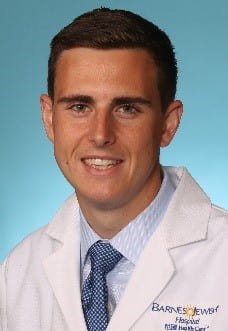
Brendan T. Heiden, MD, MPHS, has always had a particular curiosity for thoracic malignancies, like lung cancer and esophageal cancer. “In both a clinical and academic sense,” he said, “I am interested in the treatment of early-stage disease, including surgical treatment and pre-operative optimization. I am also interested in modifiable patient risk factors and disease prevention.” This interest has lead him to the general surgery residency at Washington University, where he plans to specialize in thoracic surgery and thoracic oncology.
But Heiden is also passionate about advancing research on lung cancer. He knew the MPHS degree could provide him with the tools to conduct that research, despite being initially skeptical about committing to even more graduate-level coursework. But what he found with the MPHS program was a supportive research community committed to helping students be academically productive from the start.
Heiden explained, “The MPHS is a well-established advanced degree program at Washington University, similar to a masters in public health degree, that is maintained within the Department of Surgery. As such, the research faculty (professors, biostatisticians, etc.) have a heavy interest in oncology and surgical outcomes research, among other things. The degree emphasizes tools that are valuable to clinical researchers. In particular, the program is focused on promoting academic productivity, even during coursework. For example, several students will publish papers concurrently with each course. It is a highly productive degree program, both in training students for future academic careers and in helping students build their academic resume.”
Here, Heiden provides some thoughts and advice on the MPHS program and clinical research:
How has your MPHS degree impacted your current or future work?
The MPHS is very practical, introducing students very early to statistical training (and software) as well as potential databases with which to perform research. Additionally, several faculty and professors in the Department are regularly involved in our thoracic surgery research meetings and are co-authors on our manuscripts. From this program and with their support, I pursued several additional projects like studying the cost-effectiveness of robotic lung cancer surgery; examining readmissions following pulmonary lobectomy; and studying lung cancer screening guidelines.
What advice would you give to someone in medical school or residency about clinical research?
Find your passion and listen to it. It is important to be fluid, realizing that your goals and aspirations will likely change over time. Also, do not undersell your value as a junior member of the research team. The youngest minds in the room often have the most innovative and compelling ideas. Therefore, find a supportive mentor and pursue your ideas.
What would you say to someone considering the MPHS program?
In hindsight, it was 100% worth the time and effort. The commitment of the program to supporting its students is critical. Also, classes often serve as a mixing pot of academic ideas and projects. As such, you can use the tools that you learn and people that you meet through the program to advance cutting-edge clinical research!